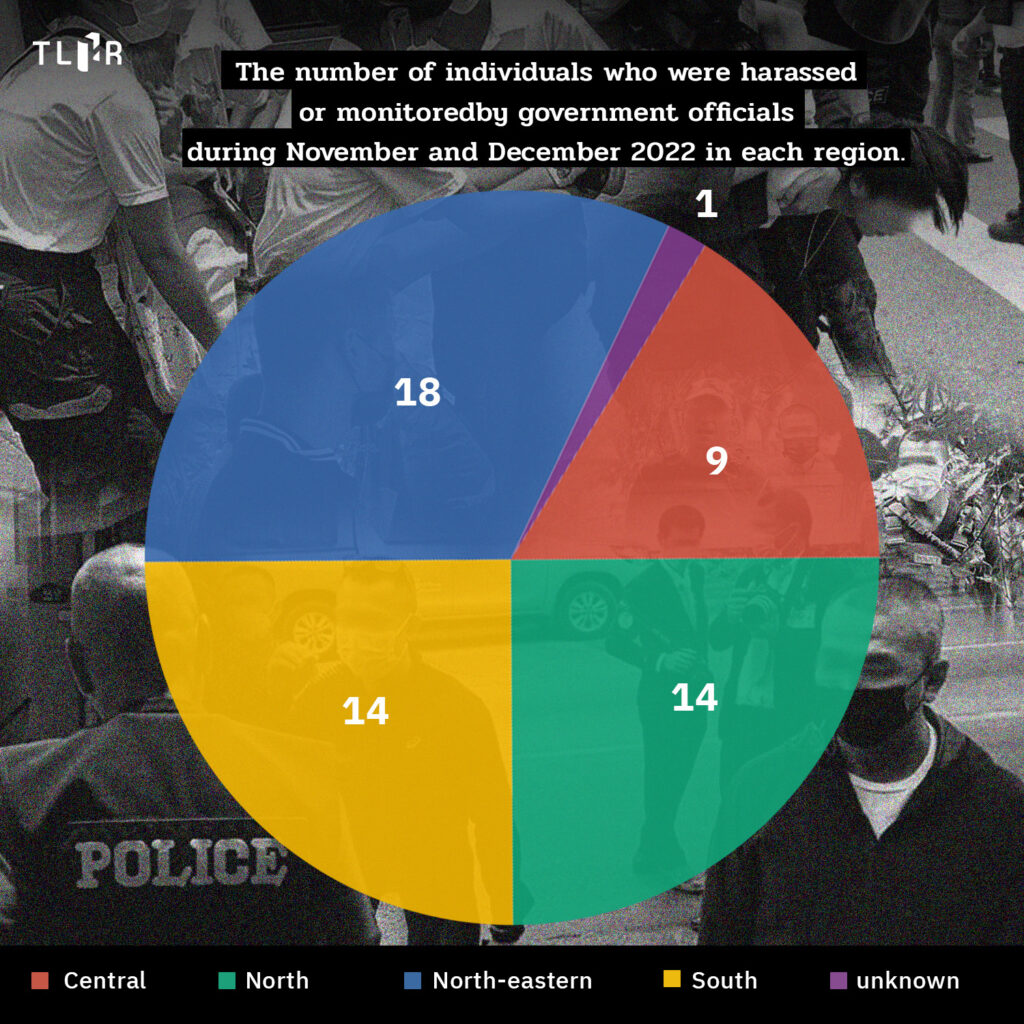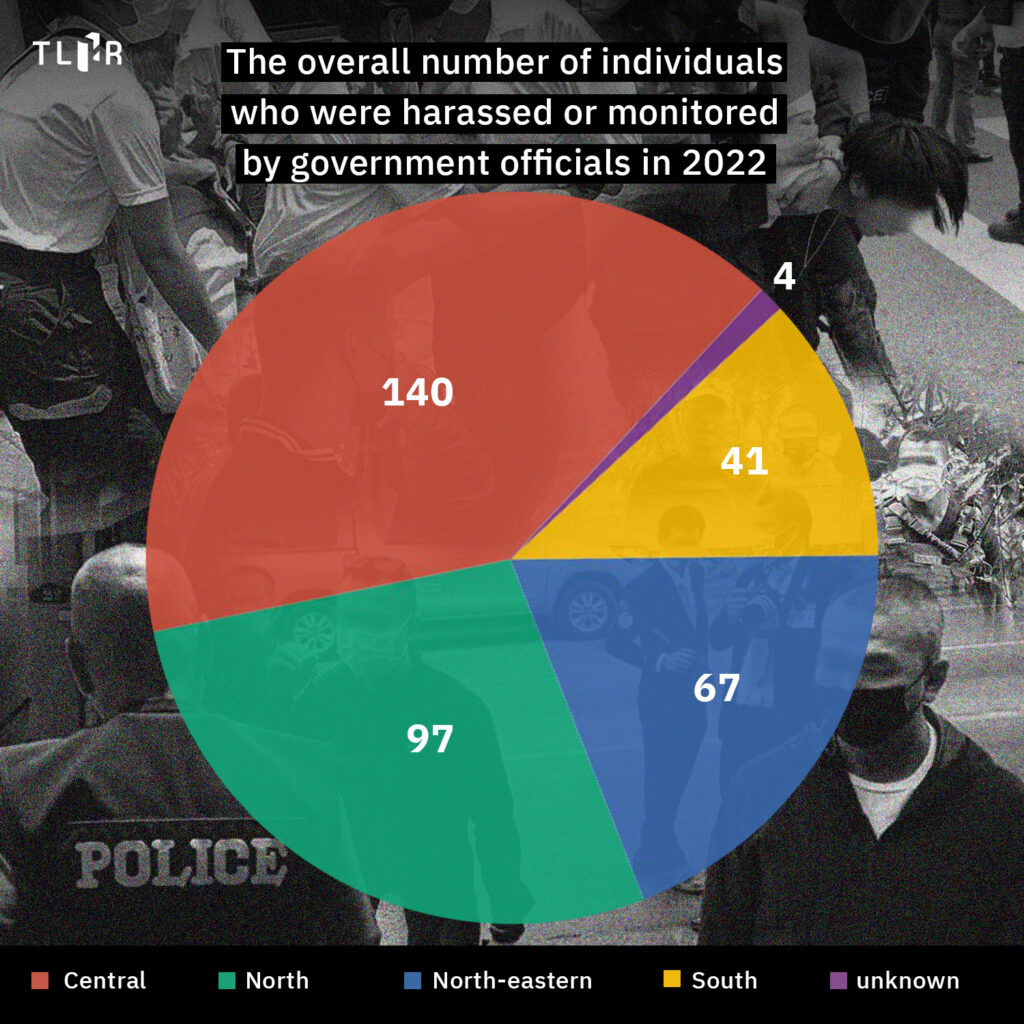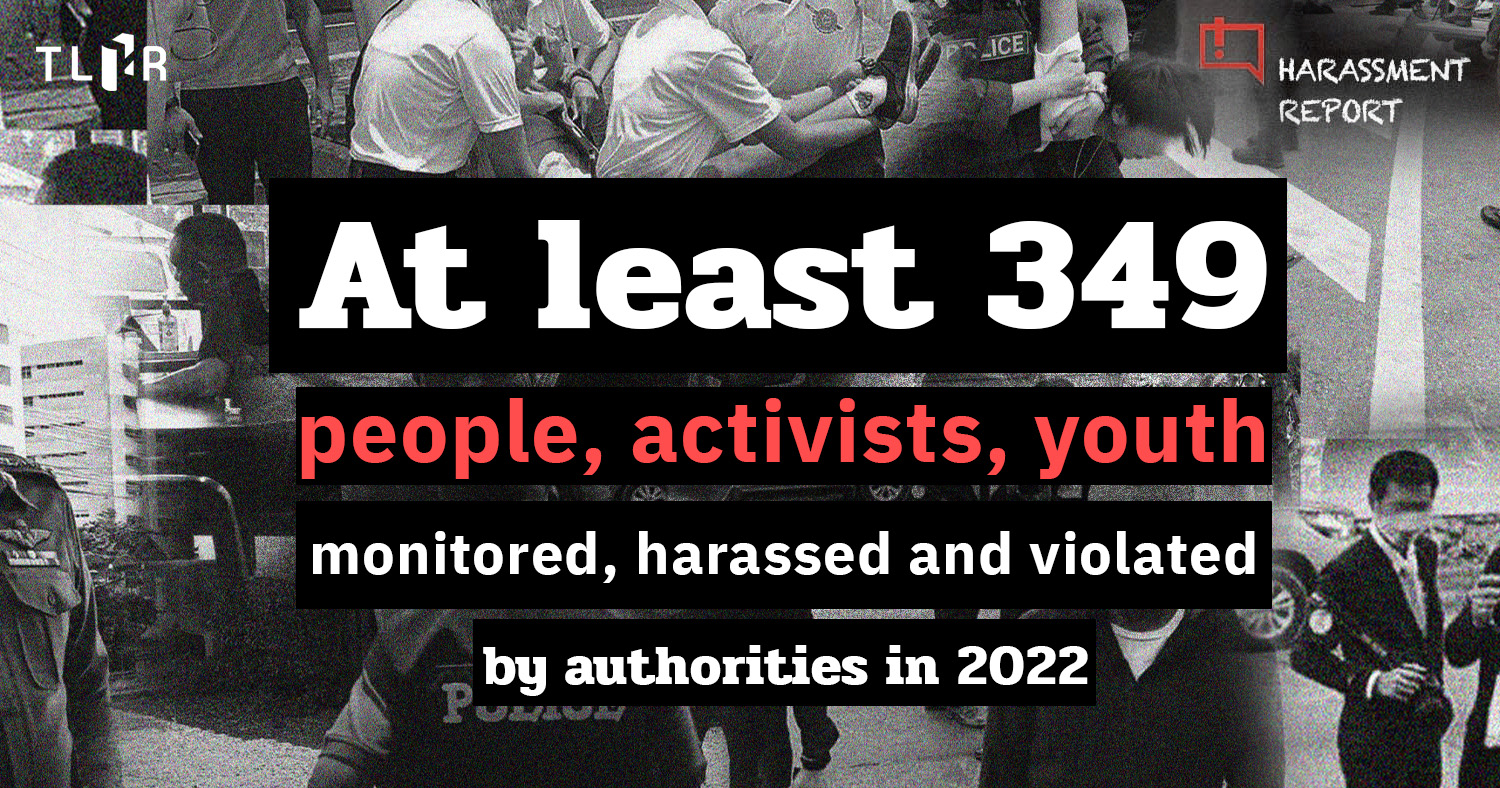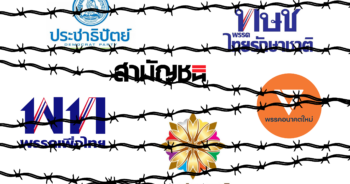In 2022, the state of harassment against activists and individuals by government officials continued and intensified, ranging from intimidation tactics such as visits at residences, workplaces, and educational institutions, surveillance and photographing, to summons for talks at private and governmental premises without a warrant or any documents.
In November and December 2022, 69 more individuals—4 of whom were children under the age of 18—were harassed and monitored by government officials. By region, 32 people in the North, 17 in the Central, 10 in the South, and 9 in the Northeast experienced harassment. The location of 1 person who experienced harassment is unknown.

Our documentation shows that there were at least 349 individuals who were harassed or monitored by government officials in 2022. Twenty-four of the group are under the age of 18; the number of children harassed and monitored is higher than that of 2021. By region, at least 140 individuals from central Thailand were harassed, 97 in the North, 67 in the Northeast, 41 in the South, and another 4 individuals reported harassment incidents without details on location. (Data as of 29 December 2022)

The above numbers do not include incidents where officials presented individuals with summons or carried out an arrest pursuant to a warrant. This number only represents cases reported to Thai Lawyers for Human Rights; the exact number may be higher.
Causes for Harassment: Nearly half of incidents resulted from visits of prominent figures on the ground
Throughout 2022, government officials’ harassment and surveillance operations against activists and individuals can be broadly categorized into five groups, as follows:
- Harassment incidents resulting from visits of prominent political figures, including the King, the Queen, other members of the royal family, and the Prime Minister, Deputy Prime Minister, and other ministers. At least 134 individuals faced harassment in this category.
- Surveillance, intimidation, and intelligence-gathering of political movements prior to and following the Asia-Pacific Economic Cooperation (APEC) Summit 2022. There had been at least 58 cases in which local communities, activists, NGOs working on environmental and natural resources, and political activists were harassed and/or monitored by government officials.
- At least 35 cases in relation to political expressions excluding assemblies, such as holding and placing signs, signature collection, conducting of polls, and holding of training.
- Online expression in relation to the monarchy (at least 23 cases) and online criticisms of other topics (at least 8 cases).
- Harassment against activists and movements on preservation of natural resources (at least 26 cases) and labor rights (at least 1 case).
- Harassment incidents before and during royal motorcades and visits of prominent political figures
The majority of harassment incidents by government officials throughout 2022 was in connection with visits by prominent political figures. Activists, youths, and individuals with a history of participating in or organizing political activities or in a “watchlist”, along with those close to them, such as family members, were the targets of authorities’ intimidation and questioning about their movements prior to, during, and after field visits by important political figures.
The visits of prominent political figures in 2022 not only include field visits of the King and the Queen, but also other important members of the royal family such as Princess Sirindhorn and Princess Bajrakitiyabha who were often invited to perform commencement ceremonies at universities throughout the country. In addition, this record counts the visits by key members of the cabinet, particularly Prime Minister Gen Prayuth Chan-ocha.
Harassment incidents as a result of visits by prominent political figures have been a common phenomenon in all regions. Government officials often call or visits residences, workplaces, and educational institutions of targeted individuals to question them about their movement, to forbid political activities, or, in some cases, to photograph their activities to report to their “superiors”.
- Harassment incidents as a result of visits by royal family members and the procession of royal motorcade
Incidents of harassment by government officials resulting from field visits by King Rama X, the Queen, and other members of the royal family include the case in which a 13-year-old and her two friends were “carried” away by the police, the case of surveillance and unlawful arrest of an activist in Northeastern province Ubon Ratchathani, ten cases of activists in lower Southern Thailand who were visited by police and soldiers during the royal motorcade of King Rama X and the Queen, and the case in which 30 – 40 officials were deployed to block activists from getting close to Princess Siridhorn’s royal procession in Nakhon Sawan.
Furthermore, there were cases in which students and graduates were monitored and harassed prior to their commencement day where members of the royal family had been invited to perform the ceremony/hand out the degree, and during royal visits in many provinces, including Phayao, Phitsanulok, Chonburi, Udon Thani, Sakhon Nakhon, and Surat Thani.
- Harassment incidents as a result of visits by members of the cabinet
Incidents of harassment by authorities as a result of visits by key cabinet members, such as the Prime Minister, include the case of in Kamphaeng Phet where activists and members of Move Forward Party in lower Northern Thailand were visited and questioned by police at their residence, the case of at least 7 activists in the South whom police visited at home and one of whom was unlawfully detained for over 2 hours, the case of at least 6 activists in Northeastern province Ubon Ratchathani who were harassed by the police, and the case of activists and individuals in Northeastern province Bueng Kan (particularly members of Bueng Kan People’s Group) who were followed and warned against carrying out any political activities.
Visits by Deputy Prime Minister Gen Prawit Wongsuwan also led to monitoring and harassment of activists and individuals. In one instance, an individual in Chonburi province shared on Facebook that a car had been parked in front of his house for 2 consecutive days, and authorities questioned his neighbor whether he was at home and further entered the neighbor’s house to look into the individual’s house. The incident occurred during the field visit by Gen Prawit Wongsuwan. Another case involves two individuals—a student and an activist—who were harassed during the DPM’s visit in Northeastern province Sisaket to monitor the flood.
One notable observation from human rights monitoring is that the targeted individuals were monitored and harassed without knowledge of a scheduled royal motorcade and without any plan to organize an activity. Such practice could in turn lead to negative sentiments regarding the monarchy.
- Surveillance, harassment, and information-gathering in connection with political movements prior to and following APEC Summit 2022
The Asia-Pacific Economic Cooperation (APEC) Summit 2022 was held in Bangkok amidst the abuse of power by government officials to intensify restrictions on expression. In particular, authorities suppressed protests organized by activists and politically active individuals to the point of dispersing the crowd with violence and sweepingly arresting and prosecuting protesters.
Government operations to track information of protesters and activists, and attempts to discourage political movements and demonstrations prior to, during, and after APEC Summit had been severe and widespread. With data retrieved from #MonitorRightsViolationAPEC2022, TLHR found that people had been monitored and harassed by authorities over 58 instances in at least 22 provinces throughout Thailand. The majority of the harassed individuals consists of villagers and activists in their movement on natural resources preservation, in particular the Assembly of the Poor, P-Move, and several networks of communities affected by mining.
- Harassment and monitoring as a result of holding up signs, collecting signatures for abolishing 112, and conducting public opinion polls
There had been at least 35 instances of individuals being harassed and monitored by government officials as a result of their political activities in 2022. These include holding up and placing protest signs, signature collection to repeal Article 112 of the Criminal Code, and conducting opinion polls on various topics.
At the beginning of 2022, local authorities harassed members of the Nakhon Phanom Si Bor Thon (translation: Nakhon Phanom Will Not Tolerate) group, a pro-democracy group in Northeastern province Nakhon Phanom. Students and activists of the group had set up a booth to collect signatures to repeal Article 112 of the Criminal Code, which penalizes any insults and threats to the monarchy (royal defamation or lèse-majesté), in front of Indo-China market in Nakhon Phanom province. A similar incident occurred in lower Northern Thailand where a group of more than 10 police officers harassed activists of Vocational Students Coalition who were collecting signatures to call for the repeal of Article 112 in Nakhon Sawan province. The police reportedly questioned their personal information and reasons for their campaign to repeal Article 112, requested to see documents containing signatures, and constantly photographed their movement. It should be noted that individuals are afforded the right and freedom to carry out such an activity under the Constitution.
In the middle of 2022, government officials barred 5 graduates, youths, and individuals who gathered on the commencement day at Thammasat University Tha Prachan Campus, Bangkok, from carrying out a symbolic political activity. Authorities confiscated T-shirts with “Repeal [Article] 112, Reform the Monarchy” message and seized “Sakdina Degree” and “Stop Reproducing Sakdina Ceremonies #SakdinaDegree” signs. Reports indicated that a nearby incident where authorities attempted to take back control of the area in front of the United Nations buildings from NPO No Bill group, a civil society group which campaigns against the Not-for-Profits Organizations draft bill, as their protest premises impede the passage of the royal motorcade to the commencement ceremony.
In the first half of 2022, TLHR also received information of harassment incidents which stemmed from groups conducting opinion polls. One of such cases is of “Bam”, an activist whom police followed to her residence after her participation in a poll-taking on royal motorcades organized by pro-democracy Thalu Wang (translation: Piercing through the palace) group. Another instance is when plainclothes police visited residences of members of pro-democracy group Thalu Gas (translation: Piercing through the [tear] gas) following their poll-taking with Thalu Wang group at the Victory Monument, Bangkok. The other case concerns an activist in southern province Songkhla whom police called to question their involvement in a poll on the royal household budget and monarchy reform at the Green Way market in Hat Yai district. The last incident is of a 18-year-old woman activist who was visited at home and intimidated by military officials who threatened her with disappearance if she fails to cease all political activities. This case allegedly stemmed from her conducting a poll to repeal mandatory military conscription.
- Online expression in relation to the monarchy and the government
Since the beginning of 2022, TLHR has received information of at least 23 harassment cases by government officials as a result of online expression on monarchy topics on social media platforms, and 8 cases on other topics.
Most of the harassed individuals stated that when posting or sharing messages on topics relating to the monarchy, government officials often monitored and harassed them through calls and house visits to inform them that their texts or pictures constitute a crime under Article 112 of the Criminal Code (royal defamation). Such pattern was evident in, for example, one case of a youth activist in southern province Phuket and another case of an artist “Bang-earn” in northeastern province Khon Kaen. In some instances, the harassed persons were forcibly asked to “cooperate” by signing a document which states their intention not to share or post any messages deemed a criticism to the monarchy. This practice was especially prevalent in connection with Facebook users who actively share and post content on the activist page “Kon Thai UK” (translation: Thai people in the UK).
In addition, some people were monitored and harassed for expressing criticisms on issues unrelated to the monarchy. Such incidents include, for example, one case of a young woman activist in the South who posted a question to former Prime Minister Abhisit Vejjajiva about the violent dispersal of protesters in 2010 at Ratchaprasong Intersection, Bangkok. Another case concerns an independent journalist in Central province Lop Buri who was visited by police at home following their live-broadcasting a protest organized by villagers who were forcibly evicted by the military. The other case involves a former political activist in Northern province Phrae who was visited by Special Branch police at home after posting a question about the use of budgets by local administrations.
- Harassment against activists and movements on preservation of natural resources and labor rights
In addition to monarchy-related and political issues, activities and movements on the topics of natural resources and labor rights also faced harassment by government officials.
In September 2022, there was an incident where Border Patrol Police Region 5, in Northern province Chiang Mai, attempted to prevent activists from organizing “12 Years of Fighting the Mines, Ban Haeng Conservation Group”. The state of harassment against activists and protesters on natural resources issues intensified prior to the APEC Summit, as reported above.
Regarding harassment against labor rights activists, TLHR received a report that a child in eastern province Chonburi was visited by police (unknown division) at home following their participation in a capacity-building training for labor leaders.
Overall, the state of harassment and violation of rights against individuals and activists by government officials continued and increased in 2022. As such, human rights violations and harassment in relation to political activities will continue to be monitored throughout 2023.
People who are monitored and harassed by government officials as a result of their political expressions can report to TLHR via all channels of communication.




